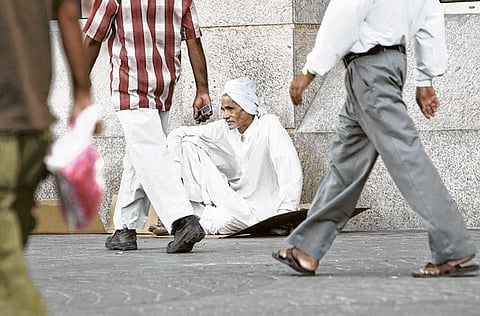Beggars exploit charitable sentiments during Ramadan
It is illegal to give to people who beg for cash in the streets

Dubai: They come knocking on your door early on the weekend. They approach you while you're filling up your car at a petrol station. They lurk near ATMs and around markets, and will not go away no matter how strongly you tell them off.
With the onset of Ramadan, the number of beggars seems to increase as most of them exploit people's religious and charitable sentiments to make easy money.
What do you do when approached by beggars? Police bodies in the UAE advise people to report any such cases immediately, and promise that action will be taken against beggars because not only do they bother people and distort the country's image, many of them are also involved in illegal activities.
While some people evaluate the beggar's situation before handing out their cash, others simply refuse to cave in under the insistence of a beggar. Yet, few even think about calling the police, despite repeated awareness campaigns telling people that this is the right thing to do.
Rashid Abdullah Al Mazroui, an Emirati government employee, said he used to give beggars money before he knew it was against the law.
The right places
"Now I tell them to show me evidence that they need the money, or ask them to go to charity organisations, which are the right places to go for people in need," he said, adding that this makes them run away fast.
Al Mazroui said he often considered calling the police, but has never done so out of pity. In Ramadan, they come knocking on the door and expect people to be generous. "I'm sure they make a lot of money this way, but I'm not giving them any," he added.
Eman Ragheb, a Palestinian administrative coordinator, said although she never gives money to beggars, she does not consider calling the police. "I don't want to cause problems for anybody, or myself, and sometimes I think perhaps these people are in real need, so I don't think of calling the police," she said.
Fellow Palestinian Jalal Al Jaberi, a consultant, agreed, adding that he had seen some strange cases, such as a man who opened his shirt to reveal a long surgical cut in his chest, and a person who once entered a coffee shop and gave all the customers a letter which stated that he had come from a respectable family but that he was facing problems and was in need of financial help.
Kamlesh Singh, an Indian operations manager at a fast food chain, said he evaluates each situation separately before deciding whether or not to give money to a beggar.
"In my old office in Sharjah, some women used to enter and ask for help. Some of them were old and others were younger with children," he said.
Singh said he used to help sometimes before he knew that begging is against the law, but he does not give money any more.
Emirati student Jaber Ahmad said he once called the police because he was so annoyed by beggars who were lurking by his car and won't go away.
"I called the police, and they came and took them. The more you give beggars, the more persistent they become," he said.
Ahmad said sometimes beggars show him medical reports or say they cannot pay the rent and will be thrown out of their homes along with their families if they fail to come up with the money.
Ticket home
Cherly Labrche, a Filipino shop attendant and UAE resident of five years, said she was once approached by a man who told her he was collecting money to buy an air ticket to go back home.
Cherly said she handed the man Dh50, which he refused to take and told her to pay him at least Dh100.
"I was shocked at his attitude and it made me sad because I realised he was cheating me and not in genuine need," she said.
Abdul Adham, a UAE resident of three years, said he was not aware that begging was against the law.
Adham, a cook, said he rarely came across beggars, except a few in Deira which he sees when he goes to the old markets.
What to look out for if suspects approach you
Some of the common tricks used by beggars:
- A woman with children tells you that her husband is jailed for bounced cheques.
- A man produces a medical report saying that he has kidney failure.
The report is signed by an unknown doctor in a distant city.
- A man sticks his burned hand inside your car window and runs away if you offer to call an ambulance.
- A well-dressed person produces a letter telling you that he is deaf and is collecting money to build a school for children with special needs.
- A man driving a car with foreign number plates tells you his wallet was stolen, a hotel overcharged him or that his child fell sick during his stay, and he needs just Dh100 to fill up the petrol tank and go home.
Police campaign
Dubai Police has recently announced the beginning of its annual campaign against begging from July 15 to the end of Eid Al Fitr.
If you are approached by any beggars you can call a special hotline on 8004438 and a police patrol will be dispatched to your location.
Last year, 714 beggars were caught out of which 251 were arrested during Ramadan.
This was compared to 618 in 2009, 578 in 2008, 987 in 2007 and 1,232 in 2006.
Sign up for the Daily Briefing
Get the latest news and updates straight to your inbox


